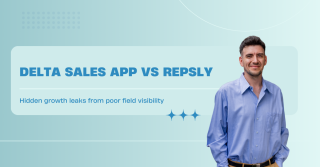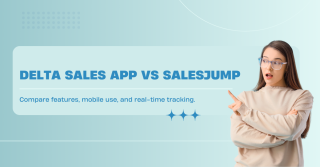How to Approach New Distribution Business in FMCG: Step-by-Step Guide for Success
_1733395802.png)
The FMCG (Fast-Moving Consumer Goods) sector offers a world of opportunities for aspiring entrepreneurs looking to enter the distribution business. From essential household products to food and beverages, the FMCG sector is vast and constantly growing, making it a lucrative space for new distributors. However, diving into the distribution business, especially in FMCG, requires more than just capital and enthusiasm. A strategic approach is essential to ensure success.
In this comprehensive guide, we will break down the approach to starting a new distributorship in FMCG, why you should consider starting with smaller companies before jumping into big brands, and the critical steps you must take to set yourself up for success. We’ll also explore how software like Delta Sales App can streamline your operations, optimize sales, and help you manage your distribution business effectively.
Whether you’re considering a new distributorship in FMCG or you’re already a distributor looking to improve your operations, this blog will provide you with insights that can make a real difference in your journey.
The Basics of FMCG Distribution Business
What Is FMCG Distribution?
FMCG distribution refers to the process of getting consumer goods, such as packaged food, beverages, personal care products, and household items, from manufacturers to the end consumers through intermediaries like distributors, wholesalers, and retailers. Distributors act as intermediaries between the manufacturers and the retailers or direct customers, ensuring products are available in stores, supermarkets, and other outlets for consumer purchase.
The key to success in FMCG distribution is understanding the dynamics of supply chain management, inventory control, sales tracking, and market development. The FMCG industry is unique in that products have a high turnover rate, but profit margins can be relatively low. This makes it a challenging yet rewarding business for distributors.
Why Choose FMCG Distribution?
Before diving into the approach to distributorship, let’s quickly examine why the FMCG sector is attractive to new distributors:
-
High Demand Products: FMCG products are essential, which means they sell regularly. Products like soaps, snacks, detergents, and hygiene products are bought repeatedly by consumers.
-
Fast Turnover: Unlike other industries, the goods in the FMCG sector are sold quickly, generating a continuous flow of cash for distributors.
-
Wide Variety: FMCG includes a broad range of products, meaning you can diversify your business by dealing in different categories, increasing your chances of success.
-
Established Market: The FMCG sector has a large consumer base, and the market is continuously growing, which means there’s always room for new entrants with the right approach.
-
Good Margins in Some Cases: While margins may not be as high as in other sectors, the volume of sales in FMCG can more than make up for it, offering considerable potential for profit.
Choosing the Right Approach: Start Small or Go Big?
A common misconception among new entrepreneurs is that they must start by securing a distributorship with a large, well-known FMCG brand to succeed. However, this isn't always the best approach for those just entering the field. Here’s why:
Starting with Smaller FMCG Companies
If you are new to the distribution business, starting with smaller FMCG companies can offer several advantages:
-
Better Margins: Smaller FMCG companies often provide better margins than larger companies. While the overall volume might be smaller, the profit you make per unit can be higher, making it easier to reach profitability in the early stages.
-
Support and Training: Smaller companies are usually more willing to work closely with distributors to help them grow. They might provide support in the form of marketing materials, promotional campaigns, and training sessions to ensure your success.
-
Lower Investment Requirements: Unlike big FMCG companies that may require large investments in stock, infrastructure, and resources, smaller companies often have lower entry barriers. You may not need huge capital to start, which allows you to test the waters before committing larger sums of money.
-
Flexibility and Learning: Working with smaller companies gives you more room to experiment and learn the intricacies of the distribution business without the pressure that comes with handling a high turnover business. These companies are usually more flexible when it comes to customizing orders, which allows you to build a relationship with your customers as you grow.
-
Market Development: Smaller FMCG companies often need distributors to help them develop new markets. As a result, they may provide more direct support in terms of market expansion and customer acquisition. This is a great opportunity to learn how to manage distribution in new areas.
-
Building a Strong Reputation: Starting small also allows you to build a reputation. As you learn the ropes and establish relationships with retailers, your credibility will increase, helping you later when you decide to expand or move into larger companies.
Challenges of Working with Big FMCG Companies
On the other hand, trying to work with large FMCG companies without prior experience can lead to some challenges:
-
Low to Moderate Margins: Big FMCG brands tend to offer low or moderate margins, meaning the distributor has to sell large volumes to make a profit. Without established market experience, it’s difficult to achieve the required turnover.
-
Higher Investment Requirements: Large FMCG companies often require significant investments in inventory and infrastructure. You may need to invest heavily in stock, transport, warehouses, and manpower.
-
Limited Support: Big companies typically have well-established distribution networks and expect you to handle the logistics, sales, and retailer relationships independently. This can be overwhelming for new distributors who may not have the resources or expertise to manage such responsibilities.
-
High Competition: Large FMCG brands have a well-established presence in the market, and securing a distributorship can be competitive. Many distributors are already vying for the opportunity, and it can be hard to break into the market without strong experience and a network.
-
Credit Risk: Dealing with big FMCG companies also means managing credit risk. You’ll likely have to extend credit to retailers, and managing this cash flow can become complicated, especially if you don't have a financial cushion.
How to Gain Practical Experience?
Start with Small FMCG Brands for Experience
While big FMCG companies might offer the allure of well-known names, smaller companies often provide better opportunities for gaining hands-on experience. Starting with smaller brands allows you to focus on learning the ropes of the distribution business, including:
-
Supply Chain Management: Learn how to manage orders, track inventory, and ensure timely deliveries.
-
Sales Management: Understand how to increase sales, build relationships with retailers, and ensure that your products are available in the right locations.
-
Customer Relationship: Learn how to establish long-term relationships with customers, understand their needs, and offer personalized solutions.
-
Financial Management: Start small and gain experience in managing cash flow, handling payments, and keeping track of expenses.
As you learn the business, you can gradually take on larger contracts, increasing your business volume, and eventually moving on to more significant brands.
How Delta Sales App Can Help New Distributors?
As a new distributor, you need tools that can streamline your operations and make the process of managing orders, inventory, and sales as easy as possible. The Delta Sales App is one such tool that can help you manage your FMCG distribution business efficiently.
Sales Tracking and Reporting
One of the core functions of any distributorship is to track sales and analyze performance. The Delta Sales App allows distributors to:
-
Track daily, weekly, and monthly sales in real time.
-
Monitor performance against targets and adjust strategies accordingly.
-
Get detailed sales reports that help you identify the best-performing products and focus your efforts where they matter most.
Customer Relationship Management
Building strong relationships with retailers is crucial for your long-term success. The Delta Sales App’s CRM feature allows you to manage customer data effectively, including:
-
Retailer contact details and communication history.
-
Personalized marketing strategies based on customer behavior.
-
Automated reminders for follow-ups, ensuring you never miss an opportunity to engage with your customers.
Order Management and Inventory Control
Delta Sales App helps you manage your inventory and orders with ease, ensuring that you can:
-
Track product availability and reduce the chances of stockouts.
-
Quickly reorder products based on real-time demand and sales patterns.
-
Manage deliveries and keep track of logistics, helping you ensure timely fulfillment of orders.
Market Development Insights
The app’s analytics and market development tools help you identify growth opportunities by:
-
Analyzing market trends and customer preferences.
-
Identifying under-served areas and expanding your customer base.
-
Understanding competitive pricing and adjusting your sales strategy accordingly.
Training and Support
Delta Sales App offers various training resources to help new distributors grow. These include:
-
Tutorials on how to use the app’s features effectively.
-
Best practices for sales and customer management.
Conclusion
Starting a new FMCG distributorship can be both exciting and challenging. The key to success lies in understanding the dynamics of the industry, choosing the right approach (starting with smaller brands), and leveraging technology to streamline operations.
If you’re new to the business, consider focusing on smaller FMCG companies that offer better margins, more support, and lower barriers to entry. With the right mindset and a software like Delta Sales App, you can grow your distribution business, improve sales performance, and eventually scale up to handle larger brands with greater ease.
By following this strategic approach and learning through practical experience, new distributors can navigate the challenges of the FMCG sector and lay the foundation for long-term success.









